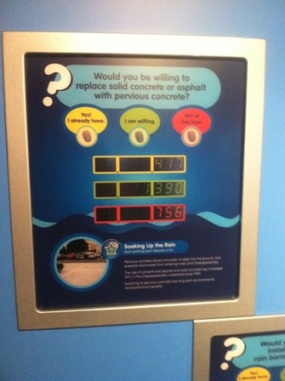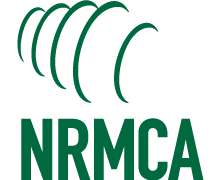
| Archive | nrmca.org | E-Store | Conferences & Events | Certifications | InFocus | Membership Directory |
Pervious Concrete Well Received at Virginia Science Museum NRMCA reported in the May 27 edition of E-NEWS that the Science Museum of Virginia (SMV) had incorporated pervious concrete into its RainKeepers Project, an urban retrofitting demonstration, monitoring, training and certification program. We are happy to now report that the first results are in and pervious concrete is a winner: "We are tremendously happy
 with the project," says Dr. Eugene Maurakis, director of science at SMV. "It has been a collaborative effort all the way from inception to submittal of the proposal, to the present. And we hope to do more." Maurakis adds that the pervious concrete has played an active role in the site’s overall low-impact development (LID) stormwater management practices which should result in reducing the annual $20,000 stormwater fee paid to the City of Richmond by as much as 50 percent. with the project," says Dr. Eugene Maurakis, director of science at SMV. "It has been a collaborative effort all the way from inception to submittal of the proposal, to the present. And we hope to do more." Maurakis adds that the pervious concrete has played an active role in the site’s overall low-impact development (LID) stormwater management practices which should result in reducing the annual $20,000 stormwater fee paid to the City of Richmond by as much as 50 percent.The pervious concrete is also a hit with visitors to the museum, noted NRMCA Senior National Resource Director Phil Kresge. The goal of the RainKeepers Project is to help the public understand the new techniques available for mitigating stormwater flows and how it can help by modifying its environmental behaviors. The exhibit features an interactive survey that asks patrons various questions about their willingness to change current practices. In response to the question, "Would you be willing to replace solid concrete or asphalt with pervious concrete," over 70% of the respondents indicated that they indeed would or that they already have done so.
The concrete was supplied by NRMCA member Titan America/Powhatan Ready Mix from its Chesterfield plant.
* Also in the May 27 E-NEWS brief, NRMCA incorrectly identified the lightweight aggregate supplier for the project. Northeast Solite Corporation, Mt Marion, NY, supplied the expanded shale material for the infiltration base beneath the pervious concrete. Kentucky Solite Corporation, Brooks, KY, expanded shale was used as the filtering medium for the bioswale and for several tree-well cisterns. NRMCA apologizes for the error and for any inconvenience it may have caused.
For more information, contact Phil Kresge at pkresge@nrmca.org.
|
|
|




